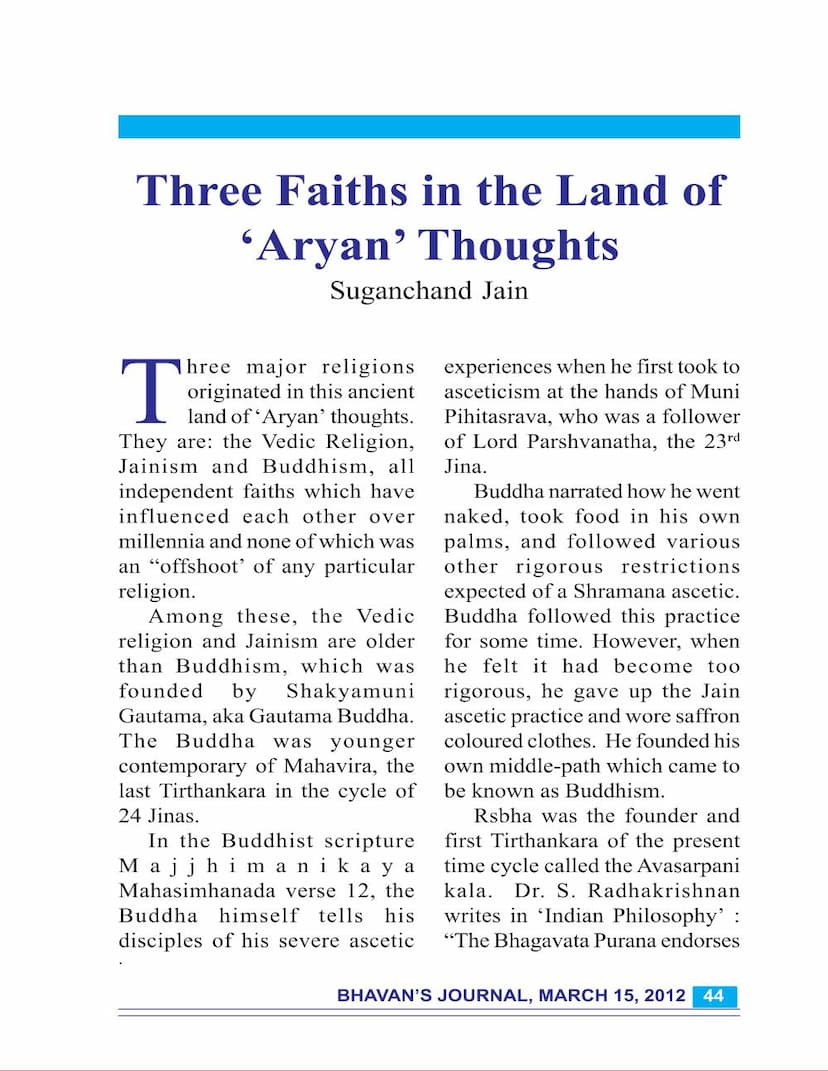Three Faiths In Land Of Aryan Thoughts
Added to library: September 2, 2025

Summary
Here's a comprehensive summary of the provided text from "Three Faiths in Land of Aryan Thoughts" by Shuganchand Jain, focusing on the Jain perspective:
The book, "Three Faiths in Land of Aryan Thoughts," by Shuganchand Jain, explores the origins and influences of three major religions that originated in ancient India: Vedic Religion, Jainism, and Buddhism. It asserts that these are independent faiths that have influenced each other over millennia, rather than one being an offshoot of another.
Origins and Antiquity:
- Jainism and Vedic Religion are older than Buddhism. Buddhism was founded by Gautama Buddha, who was a contemporary of Mahavira, the last Tirthankara of the current Jain era.
- Lord Rishabha, the first Tirthankara, is identified as the founder of Jainism in the present time cycle (Avasarpani kala). This is supported by references in the Bhagavata Purana and evidence of Rishabha Deva worship dating back to the first century BCE.
- The Yajurveda mentions three Tirthankaras: Rishabha, Ajitanatha, and Aristanemi, with Aristanemi being a cousin of Vasudeva Krishna.
- The country is named Bharatavarsha after Bharata, the eldest son of Lord Rishabha.
The Centrality of Ahimsa (Non-Violence) in Jainism:
- The concept of Ahimsa is identified as the central Jain religious and ethical teaching, and it is noted that this concept is not found in the Vedas.
- Early Vedic texts are conspicuously silent about Ahimsa. While the Upanishads contain the first literary reference to rebirth and karma, and acknowledge rebirth in animal forms, they do not mention Ahimsa. When it appears in the Upanishads, it's listed as one of five virtues (austerity, alms-giving, rectitude, truthfulness) and is presented in isolation without explanation.
- The ethical concept of Ahimsa was foreign to early Vedic Aryans who recognized no kinship between humans and animals and participated in animal sacrifices.
- The author argues that Ahimsa, along with vegetarianism, likely originated in a non-Brahminical tradition. It gained prominence when the doctrine of transmigration of souls came to include rebirth in animal forms, fostering a humanitarian sentiment of kinship among all life forms. This ethical principle is considered a great pioneering step in human history.
- Jainism's commitment to Ahimsa is considered paramount. The Jain principle is "Ahimsa Paramo Dharma" (Non-violence is the supreme religion). Jains strictly observe vegetarianism, making them the primary exponents of vegetarianism in India and taking it to its logical conclusion by avoiding killing any kind of organic life for nourishment.
- Buddhism, while promoting Ahimsa, is not as strict as Jainism. Buddhism justifies meat-eating if the animal was not killed specifically for the monk. Gautama Buddha himself adopted and then modified the rigorous ascetic practices of Jainism, eventually founding his "middle path" as Buddhism.
- Albert Schweitzer is quoted recognizing Jainism's significant contribution to ethics, stating that the commandments not to kill and not to damage are among the greatest events in spiritual history and that Jainism's ethics know no bonds, a concept first clearly expressed by Jainism.
- Walther Schubring also highlights the uniqueness of Jain ethical contributions, particularly the reverence for life that immeasurably extended the realm of life.
Interfaith Harmony and Modern Relevance:
- Jains and Hindus have coexisted harmoniously for millennia in India, celebrating common festivals like Dipavali, Holi, Raksha Bandhan, and Nava Varsha.
- Cows, dear to Krishna, are also close to the hearts of Jains, with Jains often running or financing animal shelters (panjarapols).
- The book emphasizes the importance of a secular mindset, mutual recognition, respect, and tolerance to ensure peace and human progress.
In essence, the text highlights Jainism as an ancient, independent religion with a profound and pioneering ethical system centered on Ahimsa, which predates similar concepts in other Indian traditions. It emphasizes the strict adherence to vegetarianism and the broader reverence for all life forms as defining characteristics of Jainism's unique contribution to human ethics.